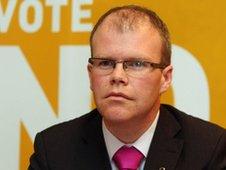Sinn Fein making hay in treaty poll sunshine
- Published

Peadar Toibin says Sinn Fein is the real opposition
Trim Castle, on the green grassy slopes of the Boyne river, is an imposing wreck.
The historic town and neighbouring Navan were once fortresses against Sinn Fein but in last year's election the party won its first Dail seat in Meath in the Irish state's history.
Peadar Toibin, the party's Meath West TD, has been busy canvassing for a No vote in Thursday's referendum on the fiscal treaty, which is designed to safeguard and stabilise the euro currency.
And although Fianna Fail is the main opposition party he says the real opposition to the Fine Gael and Labour coalition is coming from Sinn Fein.
"There isn't a hair's breadth between Fianna Fail, Labour and Fine Gael at the moment," he says, "Fianna Fail are at sea; there are power struggles happening. Sinn Fein, in contrast, is a united cohesive party with a clear ideological vision of how they want to see Ireland and that's resonating with the people of Ireland."
In these difficult recessionary times Sinn Fein in the Republic sees itself as the voice of lower and middle income earners.
Its message seems to be chiming with voters - if polls are to be believed.
With Fianna Fail still being punished for its role in the banking crisis and the government raising taxes and cutting public expenditure Sinn Fein is on the rise.
But Labour's Communications, Energy and Natural Resources minister, Pat Rabbitte accuses the party of cynical opportunism in manipulating disquiet about Ireland's and Europe's problems.
He says: "It's an irony now that the performance of Ireland is constrained by the difficulties in Europe. A year ago Ireland was Europe's problem; now Europe is Ireland's problem. That means there are circumstances there to be exploited. Sinn Fein are doing that and ignoring the fact that they are doing exactly the opposite up the road in Newry."
Cutbacks
Those comments strike a chord with John McCallister, the South Down MLA for the Ulster Unionist party.
He accuses Sinn Fein of rejecting austerity in the Republic while implementing similar measures and cutbacks, particularly in education, in the Northern Ireland executive.
"They supported the budget that implemented cutbacks all across the board. Then you look at the Republic, which is arguably in a much worse financial state than the United Kingdom. And there they're opposed to austerity and urging a No vote to the treaty. It's pure hypocrisy and should be highlighted at every opportunity," he says.
Because of the Republic's broadcasting referendum rules Sinn Fein, as the main party opposed to Thursday's referendum, has been getting extensive publicity for its anti-austerity message.
The party's deputy leader, Mary-Lou McDonald, who has been a frequent contributor to programmes, rejects that charge of hypocrisy saying Northern Ireland and the Republic's political and economic arrangements are currently very different.
She said: "The realities in the two jurisdictions are like comparing apples and oranges. In the north there simply aren't the tax-raising and fiscal powers that there are in the south. What you need to do is to ensure those powers are devolved to the Assembly and then you can have much more coherence north and south in terms of policy formation."
The Republic's next general election is due in 2016 - a big year in the republican calendar and for the Sinn Fein project.
If current polling trends continue - and it is a big if - the party could well be in government north and south of a border it opposes.
Then again if Greece and the Republic of Ireland are forced out of the Eurozone and the markets decide the new punt is a satellite currency of sterling many will then wonder what Easter 1916 and the last 100 years was all about?
- Published2 March 2012
- Published26 May 2012
- Published25 May 2012
- Published14 May 2012
- Published2 March 2012